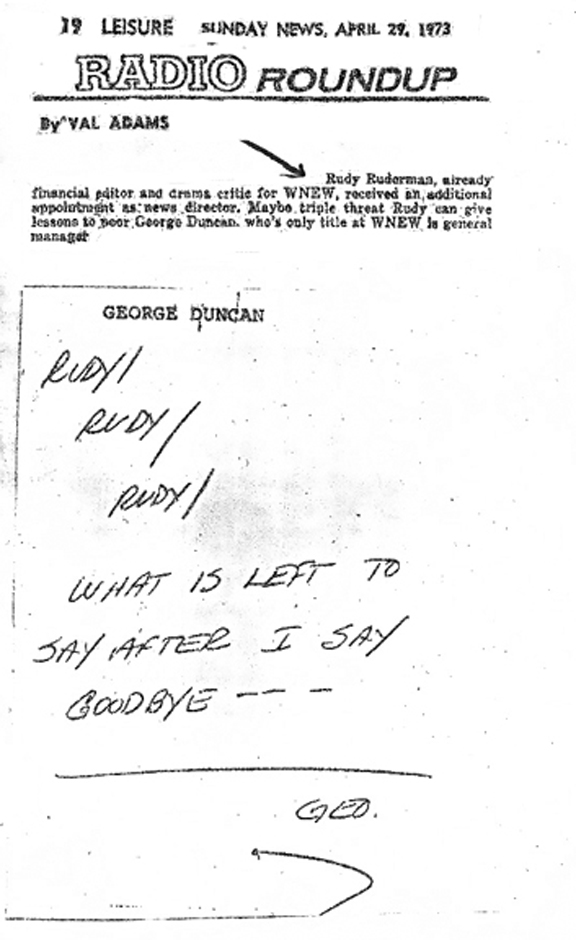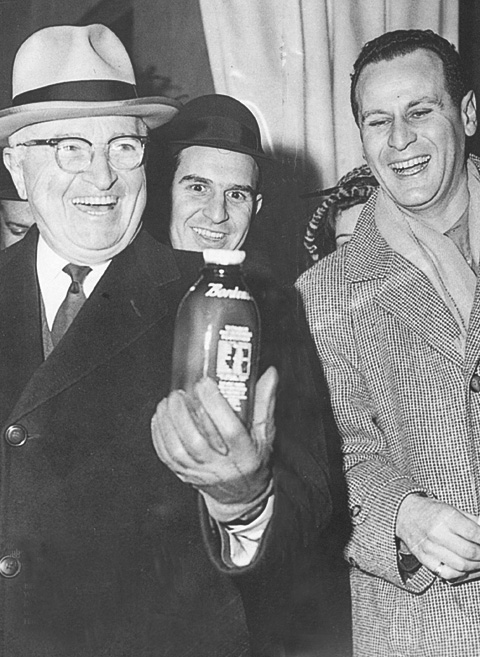“I Love Rudy Ruderman, ” a song composed by WNEW listener Addy Feiger was performed by her on July 14, 1963 at Madison Square Garden before a crowd of 18,000 attending WNEW’s 30th anniversary party. Click on link below.
Rudy died at age 86 on March 9, 2013. His memorial service was held March 18.
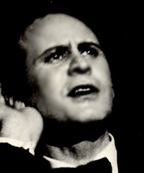 Rudy Ruderman, during his more than 20 years at WNEW, held quite a few different jobs, sometimes a few of them at the same time. NY Daily News Radio & TV writer Val Adams took note of this in an April 29, 1973 column, (below) prompting from WNEW GM George Duncan, a note to Rudy that years later would surface when R.R. rescued files from some cardboard boxes that had been sent adrift in a basement flood.
Rudy Ruderman, during his more than 20 years at WNEW, held quite a few different jobs, sometimes a few of them at the same time. NY Daily News Radio & TV writer Val Adams took note of this in an April 29, 1973 column, (below) prompting from WNEW GM George Duncan, a note to Rudy that years later would surface when R.R. rescued files from some cardboard boxes that had been sent adrift in a basement flood.
Those fuzzy lines cut and pasted from Adams’ column read as follows: “Rudy Ruderman, already financial editor and drama critic for WNEW, received a new appointment as news director. Maybe triple threat Rudy can give lessons to poor George Duncan, whose only title at WNEW is general manager.”
But, what did GM Duncan mean by “Goodbye”? Was Ruderman fired? No, that would come later. Rudy would be fired about eleven months later on April Fools’ Day, 1974. His successor, Dick Stapleton, would be fired a year later on April Fools’ Day, 1975. Now, back to the memo . . .as Rudy explains.
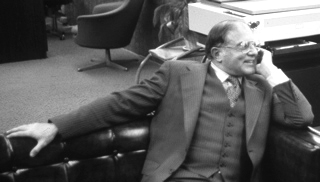
“I think all Duncan (left) meant was a cute response to Val Adams’ ‘triple threat Rudy’ line. Not only did he not imply a threat to me by saying “goodbye,” but a year later, after (new GM Carl) Brazell told me to fire and not replace all the editors, I resigned in protest. Then George, who was Metromedia President by that time, called me to say “Don’t quit, Rudy! Wait a week, and we’ll fire you, so you can get severance pay and qualify for unemployment insurance.”
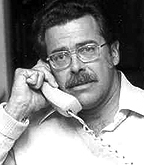
George Duncan had been promoted to President of Metromedia Radio Division, after about two years as GM of WNEW-AM, following his immensely successful turn as GM of WNEW-FM between 1968 and 1971. He was replaced as the AM GM by Carl Brazell, (right) who was replaced as News Director by Ruderman, which gets us back to the memo one more time. Rudy R. goes on to say he was out of work for four months, then . . .
“. . .then, suddenly, my successor, Dick Stapleton, hired me to replace the vacationing Andy Fisher on the overnight newscaster shift Christmas week, then to do weekend mornings, and Bill Scott gave me weekend overnights at WINS, and Bob Kimmel hired me as a producer at NBC Radio net. From there, as you know, I moved over to NBC’s NIS (News and Information Service) as Business Correspondent when Bob Dallos left. Among my most satisfying memories there was working with you and Cameron Swayze. I also remember getting a heart attack on Ash Wednesday in ’77, a couple of months before the all-news network went kaput.”
NBC’s NIS, sadly, did go kaput, but R.R., happily, did not. E.C.B.
George Duncan photo by Claude Hall
Carl Brazell photo by Dan Barrett
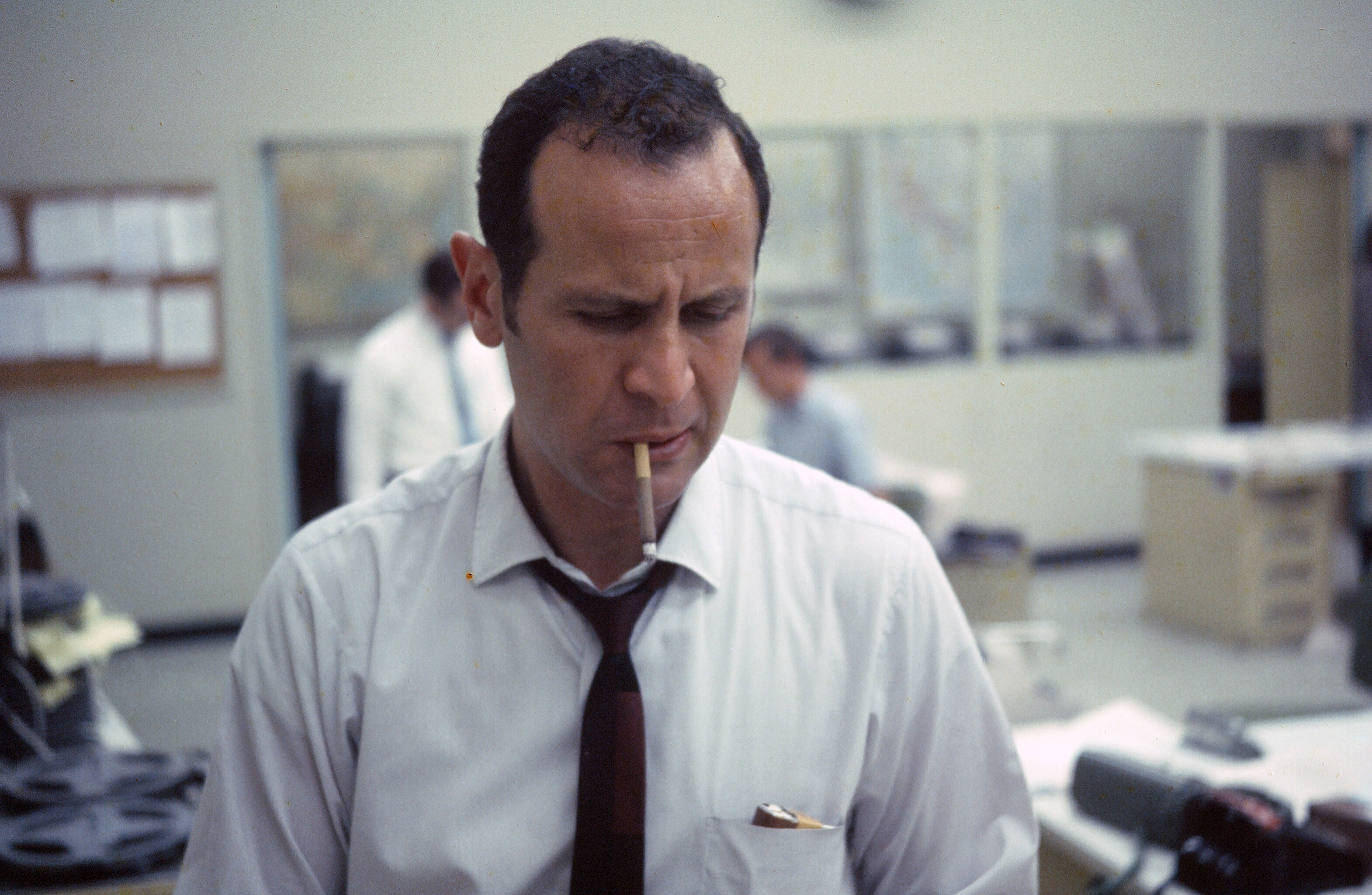
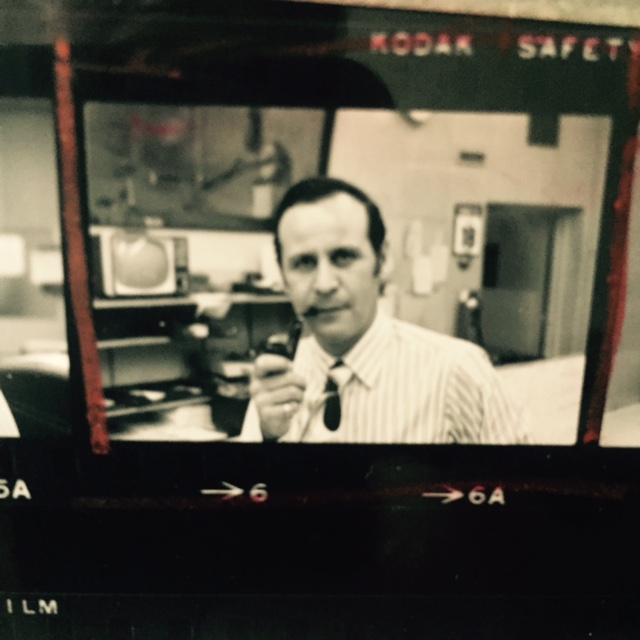
From Bill Diehl, comments from the memorial service for Rudy Ruderman, March 17 in Larchmont, N.Y., followed by comments from Andy Fisher, Al Wasser, Carolyn Giatris, Mike Eisgrau, and Edward Brown.
It was a wonderful farewell to our beloved Rudy and the Larchmont Yacht Club was a beautiful setting. A good crowd was on hand, family, friends, and former broadcasting colleagues.
A few surprise guests included WCBS business editor Ray Hoffman and Bill Stoller who is the webmaster for the ABC Radio News site. Bill had only a brief remembrance of Rudy from the early 1970’s, but it was a delightful one. He told of how Rudy helped him get a part time job as a WNEW reporter that lasted for a few weekends, and later gave him a glowing reference for a correspondents slot at ABC Radio News. Mike Stein (once WNEW News Director) was at ABC as a network manager and said, “if Rudy Ruderman says he’s good, then he’s good for us.” Because of Rudy’s endorsement, Bill didn’t have to audition.
I told the memorial gathering of an incident in 1967 when I was new to WNEW. One night, after my news-casting shift ended, Rudy invited me to go with him to the upper east side to a bar called Malachy’s, where he introduced me to this big, funny, lovable Irishman, Malachy McCourt. When we left after a few beers Rudy said, “there Bill, now you’ve gotten a real taste of New York.”
I read messages from Edward Brown, Mike Eisgrau and Carolyn Tanton-Walden-Giatras, which was a real crowd pleaser. There’s was lots of laughter about how Rudy wired her bra with a hidden microphone and sent her to do a story about shoplifting by actually shop-lifting at Kleins Department Store. She got caught. Rudy had told her not to worry about getting caught because that would make an even better ending than if she got away with it.
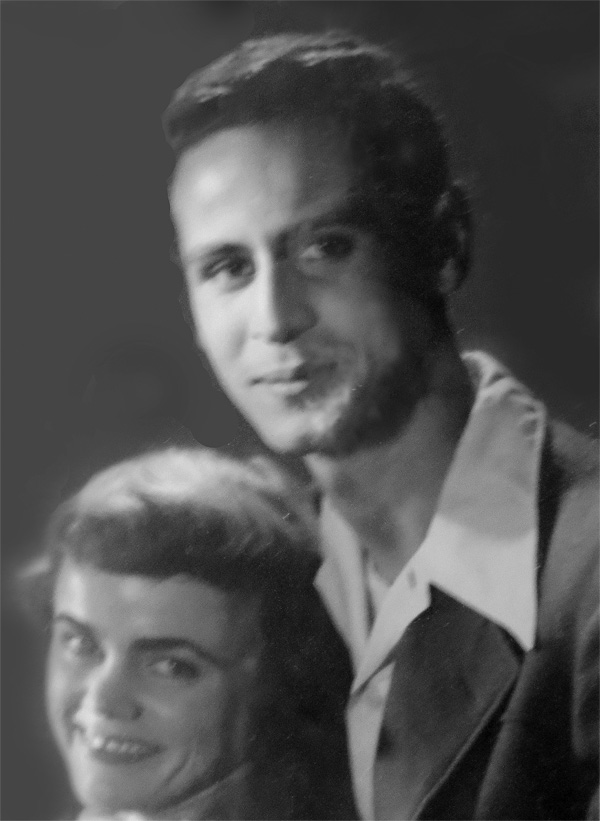 Rudy’s sons, Jim and Dan and sister Anita all spoke. Jim began with delightful remembrances of his dad, funny ones, too, including the time Rudy was ‘wounded’ during WWII when he was knocked off a tank. Jim said he hit a tree branch while riding outside the tank. Anita, in her version, said, “What really happened was that he was looking at two pretty girls, and didn’t see the branch. Rudy suffered some head injuries in that incident, not bad enough, however, to send him home.
Rudy’s sons, Jim and Dan and sister Anita all spoke. Jim began with delightful remembrances of his dad, funny ones, too, including the time Rudy was ‘wounded’ during WWII when he was knocked off a tank. Jim said he hit a tree branch while riding outside the tank. Anita, in her version, said, “What really happened was that he was looking at two pretty girls, and didn’t see the branch. Rudy suffered some head injuries in that incident, not bad enough, however, to send him home.
The memorial rooms were filled with Rudy memorabilia including his WWII dog tag. There were photos of him in uniform, with his beloved late wife, Tully, and on-the-job shots including one with Harry Truman.
photo above appeared December 23, 1960 in the Journal American
Did you know Rudy co-wrote a song? — Gee, But You Gotta’ Come Home –Guy Mitchell recorded it. The sheet music cover was on display. Lots of recordings were played of Rudy’s work reporting business news, reviewing a couple of plays, and one that I provided of an October 1968 newscast in which I switched to Rudy in Times Square where he would get public reaction to President Lyndon Johnson’s decision to halt the bombing of North Vietnam.
Rudy had two ten year old cats, a brother and sister, in good health, someone at the memorial adopted them on the spot. There were some emotional moments as brothers Jim and Dan spoke. it even happened to me as I closed my remarks. I thought I’d be fine, but toward the end, it got to me.
Andy Fisher — No one person on the WNEW staff was more influential to my career than Rudy Ruderman. He was my first friend when I had no friends; a ready and willing teacher when there was much for me to learn; a patient mentor who encouraged me to help him compile the statistics for his financial reports; a helpful editor when I moved into the ranks of writers; the assistant news director who moved me into his afternoon-editor shift; and even, incredibly, a vacation replacement for me after he left full-time employment with the station.
He had a prodigious, unfailing, ingenious sense of humor that ensured that working a shift with — or for — him would be an enjoyable experience. It was, notably, not a selfish sense of humor; as befits a master editor, he enjoyed other writers’ clever leads as much as his own. And it was never humor at the expense of precision. The facts were never bent just to get a laugh. He was an expert at mediating the fights that frequently broke out in the newsroom about 4:00 in the afternoon. He was merciful when my work would fall short; management never found out about some of my worst mistakes.
Once, I called him, “Sir,” and he quickly reminded me that he, too, had been an enlisted soldier and wouldn’t put up with that kind of approach. He was a great exponent, without actually talking about it, of the equality that exists, or should exist, among journalists in the really great newsrooms. He never let me forget that he was my friend, and I was his, and we often reminisced about the unforgettable people and events of those long-ago days in the newsroom with the high ceiling and the beeper booth and the clattering teletypes and blasting bulletin bells.
He is gone from among us, and we have suffered a great loss. A.F.
Al Wasser — I met Rudy on Julyt 8, 1958, when he was program director of WHK radio in Cleveland and I was a young, aspiring newsman just out of college and starting my first job. I remember him as a warm and gregarious boss and mentor, generous with tips to help the newbie. A few months later, after he’d returned to New York, he was equally generous in putting in a good word for me with the WNEW brass, giving me an entree to a job at the station I’d grown up listening to. Over our years as colleagues, Rudy was a rock; always cheerful, full of wisdom, oh so funny. And what a terrific newsman he was; who can forget his daily insightful interviews with young stockbrokers who later became Wall Street superstars. Without Rudy, I still might not know that the Dow isn’t the whole market.
Even after we went our separate professional ways, his generosity of spirit was evident in hard times; the lovely memorial for his lovely wife Tully that he organized in Central Park; the cheerfulness he maintained and showed at the “coming-out” party Claudia Dreyfus of the Times gave when his ’80s nightmare came to a close.
I’m eternally grateful that I had the good fortune to know Rudy Ruderman; RIP. A.W.
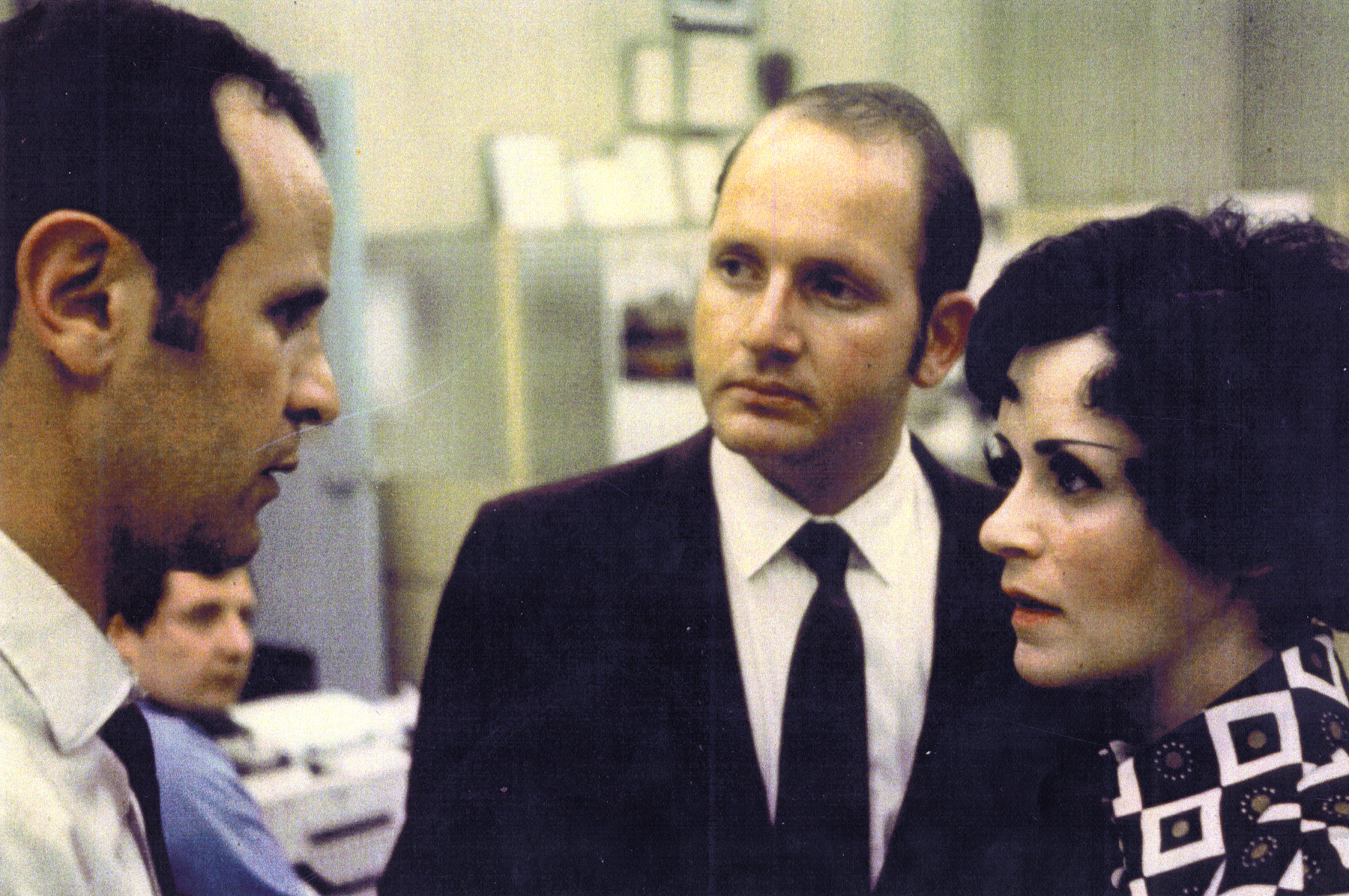
Rudy with Mike Eisgrau and Carolyn Giatris. Ray Rice seen behind them.
Carolyn Giatris (in an e-mail to Bill Diehl) I hadn’t heard. Please be sure to say that Rudy had a big influence on my career. He was my cheerleader and the one that came up with the idea to have me go “shoplift” at Kleins Department Store at Christmas time to do a story on shoplifting. It was in those days something else to get wired up with a secret mike…we laughed as they put the mike in my bra and ran the wire down my back. All the while he kept saying “this is gonna be great….gonna be great.” Well, I don’t know how great it was….because I didn’t get away with it. The in-store security got me. His reaction….”don’t worry, kid……this’ll be better for the ending.”.
I feel lucky to have known him. C.G.
Mike Eisgrau — I guess of the many good words I can use to describe Rudy—the one which stands out in my mind is “mentor”. I’m a New Yorker—but in 1967, after 5 years in the midwest, at journalism grad school,as a writer at WLS/ABC News in Chicago, and then as a young radio and TV anchorman in Elkhart/South Bend, Indiana—it was still a daunting challenge for me to be brought from small town radio and TV to the finest local radio newsroom in the U.S.
In Indiana I had no one to help me along—I had to learn by myself. But, from almost my first day at WNEW, Rudy was there to help me learn the New York ropes. It was hard for me to believe that I had a true professional actually watching over my copy and my reports from the field. Those first few weeks were quite scary for me—especially since I was thrown into four civil rights riots in two weeks—including Newark. But through those first couple of years—and beyond—Rudy’s was a steady hand on my progress—he was my mentor—something for which I will always be grateful. M.E.
Edward Brown – Media memory, as a summary judgment of an individual life, often misses events and attributes that do not earn the lasting attention of a headline or attract even the smallest notice, but which can be the fuller part of the measurement of that life.
The comments published on the internet by Al Wasser and Andy Fisher help offer a fuller account of Rudy’s life as a moral and honorable bag’a bones who earned the affection and admiration of those who were close to him personally and collaborated with him professionally. In a profession where colleagues are also competitors, Al and Andy note that Rudy gave generously of his skills, knowledge, experience, good nature and gentle humor to brighten both the spirits and career prospects of those in his charge.
To that view of him, I give loud assent and add my own evidence of Rudy putting his talents selflessly in service to others. I was present, for example, at times when he would rescue a reporter’s failing work, mine included, by providing the right fact or changed perspective, neither receiving, nor seeking recognition. He had a cool head and a kind heart and delighted in the success of others.
Rudy was a devoted family man and professional– a generous, caring man.–a good man. What better can be said of a man? What finer legacy is there?

